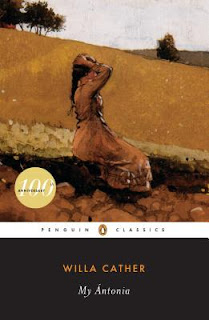As I looked about me I felt that the grass was the country, as the water is the sea. The red of the grass made all the great prairie the colour of wine-stains, or of certain seaweeds when they are first washed up. And there was so much motion in it; the whole country seemed, somehow, to be running. (p. 12)
As we walked homeward across the fields, the sun dropped and lay like a great golden globe in the low west. While it hung there, the moon rose in the east, as big as a cart-wheel, pale silver and streaked with rose colour, thin as a bubble or a ghost-moon. For five, perhaps ten minutes, the two luminaries confronted each other across the level land, resting on opposite edges of the world. (p. 206)
She had only to stand in the orchard, to put her hand on a little crab tree and look up at the apples, to make you feel the goodness of planting and tending and harvesting at last. All the strong things of her heard came out in her body, that had been so tireless in serving generous emotions.
It was no wonder that her sons stood tall and straight. She was a rich mine of life, like the founders of early races. (pp. 226-227)
This book was even more beautiful than I remembered, and I am grateful I took the time to read it again. In the end, I let First Son choose between this book and Death Comes for the Archbishop, because by that point we knew he was considering the seminary, and he chose the other one. Which is also beautiful!
I have received nothing in exchange for this post. I received this book from another member of PaperBackSwap.com (affiliate link). Links to Bookshop are also affiliate links.

